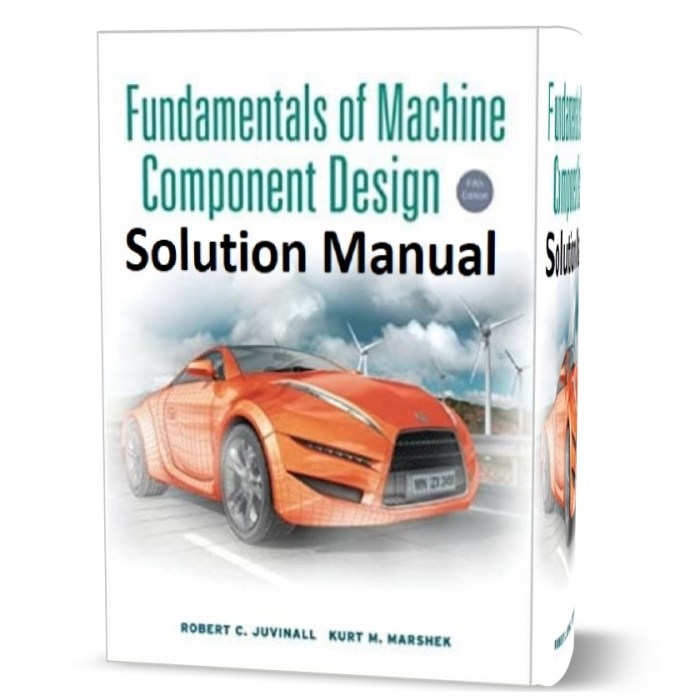Juvinall Fundamentals of Machine Component Design delves into the intricacies of designing and analyzing machine components, providing a comprehensive understanding of the principles, theories, and practical considerations involved in this critical engineering discipline.
This foundational text guides readers through the essential aspects of machine component design, empowering them with the knowledge and skills to create reliable, efficient, and durable components that meet the demands of modern engineering applications.
Fundamentals of Machine Component Design

Machine component design is the process of creating and selecting components that meet the functional requirements of a machine or system. It involves understanding the principles of mechanics, materials science, and manufacturing processes to design components that are strong, durable, and efficient.
The principles underlying machine component design include:
- Strength:Components must be able to withstand the forces and loads applied to them without failing.
- Stiffness:Components must be able to resist deformation under load.
- Wear resistance:Components must be able to withstand wear and tear over time.
- Fatigue life:Components must be able to withstand repeated loading without failing.
The design process involves several steps, including:
- Defining the functional requirements of the component
- Selecting the appropriate materials and manufacturing processes
- Analyzing the component for strength, stiffness, and wear resistance
- Testing the component to verify its performance
Types of Machine Components, Juvinall fundamentals of machine component design
Machine components can be classified into various types based on their function, material, and shape. Some common types of machine components include:
- Structural components:These components provide support and stability to the machine, such as frames, beams, and plates.
- Mechanical components:These components transmit motion and power, such as gears, shafts, bearings, and couplings.
- Electrical components:These components control and distribute electrical power, such as motors, generators, and transformers.
- Fluid components:These components handle fluids, such as pumps, valves, and pipes.
Components can also be classified based on their material, such as metal, plastic, or ceramic. The shape of a component is often determined by its function and the manufacturing process used to create it.
Material Selection for Machine Components
The selection of materials for machine components is critical to their performance and reliability. The properties of a material, such as its strength, stiffness, wear resistance, and corrosion resistance, must be carefully considered when selecting a material for a specific application.
Common materials used in machine component design include:
- Metals:Metals are strong, stiff, and wear-resistant, making them suitable for a wide range of applications.
- Plastics:Plastics are lightweight, corrosion-resistant, and easy to mold, making them suitable for applications where weight and cost are important.
- Ceramics:Ceramics are hard, wear-resistant, and heat-resistant, making them suitable for applications where extreme conditions are present.
The selection of a material for a specific application depends on the functional requirements of the component and the operating conditions.
FAQ: Juvinall Fundamentals Of Machine Component Design
What is the importance of material selection in machine component design?
Material selection is crucial as it determines the component’s strength, durability, wear resistance, and other performance characteristics, ensuring that the component meets the functional requirements of the application.
What are the key design considerations for machine components?
Key design considerations include strength, stiffness, wear resistance, fatigue life, and manufacturability, ensuring that the component can withstand the operating loads, maintain its shape, resist wear and tear, and be produced efficiently.
What are the common failure modes in machine components?
Common failure modes include fatigue failure, wear failure, fracture, and buckling, which can occur due to excessive loading, material defects, or improper design, leading to component failure and potential system malfunctions.